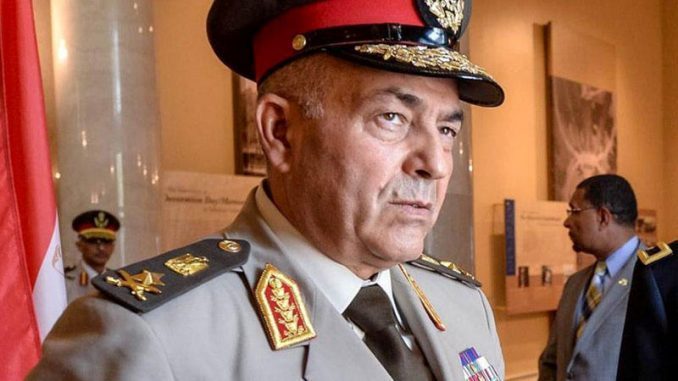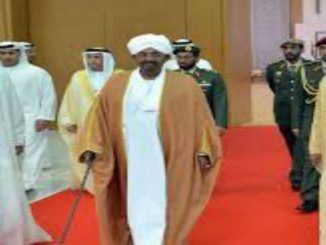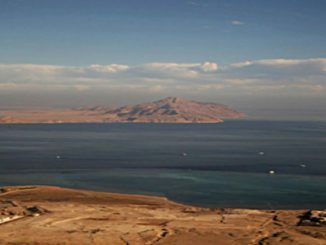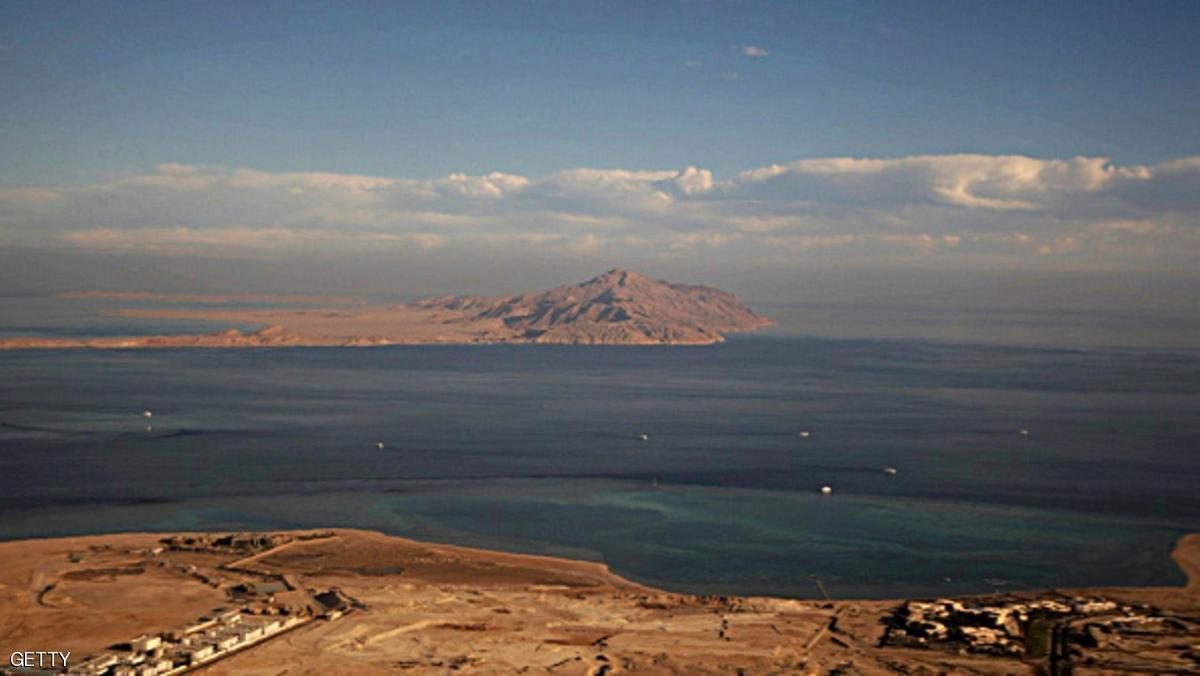
On October 28, at an unexpected move, Abdel Fattah al-Sisi’s dismissed his Armed Forces’ Chief of Staff Mahmoud Hegazy,but although the reasons behind the decision remain unclear, available information points at recent tensions between two men who have a history of personal rapport.
A source personally close to Hegazy said to “MAda Masr newspaper” that since he was relieved of his high-profile, pivotal position and given the symbolic title of presidential adviser, his movements “seem very limited, as does his and his family’s reception of non-immediate family.”
The source added, “The only thing that’s certain is that Hegazy is insulted by the way his position was terminated.”
Hegazy’s replacement as chief of staff is Mohamed Farid Hegazy, the former secretary general of the Defense Ministry and secretary of the Supreme Council of the Armed Forces (SCAF).
In addition, a government source, who speaks on condition of anonymity, is unaware of any specific political duties assigned to Hegazy in his new role and says that he does not currently have an office to which correspondence can be sent. “An office may be assigned to him in the future, of course,” the source points out.
They added that Hegazy’s previous responsibilities are being reassigned to three offices: that of the deputy defense minister for external affairs, the head of the General Intelligence Services and the foreign affairs minister, all under the direct supervision of the president’s chief of staff.
Therefore , it is unclear what Hegazy will be doing, according to the sources.
According to the source, officials have been ordered not to highlight to the media exactly which duties are being executed by the new Armed Forces chief of staff and others who have taken over Hegazy’s files, who adds that instructions were given to address the new chief of staff as Mohamed Farid, instead of Mohamed Farid Hegazy, “perhaps to avoid confusion.”
In fact, Hegazy’s dismissal was seen as both sudden and puzzling due to the rapidity with which he had risen through the echelons of power in post-2011 Egypt, and because of his personal connections to the president. According to the Report published in “MAda Masr newspaper”
Hegazy’s Rise During the Revolution
A politician whose name has been associated with the 2011 uprising, speaking on condition of anonymity, said,”He was present, even prominently so, in a lot of the meetings [of military officials] convened during the first few days of the January revolution.” He added that during the second half of 2014, a few months after Sisi became president, Hegazy “appeared to be self-confident. He didn’t hesitate to present his views, unlike others.”
One of Hegazy’s most notable appearances was at a press conference after the violent dispersal of protests outside Cairo’s Maspero television building on October 9, 2011 left 28 civilians dead, 26 of whom were Coptic Christians.
While sitting next to Major General Mohamed al-Assar, then a member of the ruling SCAF, Hegazy denied calmly and authoritatively the involvement of military officers or conscripts in the violence against the young Coptic protesters.
Two years later, after the military coup in 2013 against Egypt’s first democratically elected President Mohamed Morsi, Hegazy was al-Sisi’s second-in-command. Sisi had become defense minister under Morsi, replacing Hussein Tantawi, who had been de facto head of state since President Hosni Mubarak’s ouster in February 2011 until Morsi’s election in June 2012.
A political aide of a presidential candidate who ran in the 2012 elections,who speaks on condition of anonymity,said that efforts to convince Morsi to hold early elections instead of terminating his rule altogether were rejected by Hegazy, who was avidly opposed to allowing the Brotherhood to participate in presidential elections or to rule.
Al-Sisi took over and installed Sedky Sobhy — who at 57 was one year his senior — as defense minister and Hegazy — who was three years ahead of Sisi in the military hierarchy — as the Armed Forces’ chief of staff.
The chief of staff is considered the most powerful position in Egypt in military terms because whoever holds the post is authorized to give orders to deploy tanks.
At that at time Hegazy’s appointment raised eyebrows because he was linked to Sisi through marriage: Sisi’s son Mahmoud is married to Hegazy’s daughter Dalia.
“Hegazy was the closest to Sisi. They met alone at least once a week which made everyone jealous,” said an anonymous political analyst close to military circles. A European ambassador, who also chose to withhold their identity, agrees, “He’s more powerful than the defense minister when it comes to his relationship with the president. I can confirm that without hesitation. It is evident from their many direct exchanges.”
A More Powerful Role after the Military coup
It was obvious that after 2013, Hegazy has gained more powerful position that even expanded his military roles.
The analyst mentioned that Egyptian government officials felt that Hegazy’s duties expanded beyond military matters and into politics. For example, he directly oversaw the operations of Egypt’s Military Intelligence and the situation in Sinai, in addition to devising security and political resolutions for the conflict in Libya and Egypt’s relationship with the United States.
Hegazy’s rise to the top did not necessarily hinge on his allegiance to Sisi.
A military official who was discharged from service in 2016 and knew Hegazy closely said, speaking on condition of anonymity, that a few months ago the former chief of staff would have never sided against a decision agreed upon by the majority of the Armed Forces leaders,”On the contrary, it’s said that he approached those whom he was confident had concerns about al-Sisi’s decisions — especially during the disagreement about ceding sovereignty over the two Red Sea islands of Tiran and Sanafir to Saudi Arabia — to implicitly assure them that his affinity with al-Sisi would not stand in the way of taking whichever course the Armed Forces chose at any point in time.”
According to another European ambassador, several Western officials who met with Hegazy came out of meetings wondering what ambitions the powerful second-in-command, who seemed absolutely loyal to the president, might have.
The ambassador said some of his Cairo contacts suggested that al-Sisi sees Hegazy as “the Medvedev to his Putin.”
The ambassador was referring to current Russian Prime Minister Dmitry Medvedev, who served as president from 2008 until 2012 as a means to sidestep the term limits mandated by Russia’s constitution, which prevented President Vladimir Putin from running for a third consecutive term.
Putin served as Medvedev’s prime minister before taking over the presidential office again after the latter’s term concluded in 2012.
The ambassador, however, said he finds this unlikely, as Hegazy “is a very self-confident and assured man who immensely trusts his own political and military abilities.”
The ambassador said,”I don’t think he would ever agree to be a Medvedev.”
He added,”He is fine with being the second-in-command and a powerful partner who’s ahead of others, but he would not be OK with being a placeholder. Perhaps he would like to play the lead one day.”
In the same context, a former Egyptian minister who crossed paths with the outgoing chief of staff, also spoke on condition of anonymity, makes similar assertions,”He was the powerful second-in-command, whose power and competence are recognized by everyone, who does not object to being the powerful military man, but would not accept being a lowly executive.”
It was a few months ago that signs of Hegazy’s marginalization quietly started to emerge, when al-Sisi appointed Mohamed al-Shahat as head of Military Intelligence and Osama Askar as the Armed Forces’ deputy commander in chief for the development of Sinai, taking over the file from Hegazy.
The Reasons behind the dismissal
Although there were signs that there would be disagreement or fear from Hegazy’s power, no one saw Hegazy’s dismissal coming.
According to the analyst, it left even Egypt’s top military brass puzzled.The analyst said that Hegazy was called in to meet the president immediately on his return from a mission to the United States, before the October 28 announcement.
In fact, confused officials at the Egyptian Embassy in Saudi Arabia, who were in the midst of coordinating with Hegazy’s office about a visit to Riyadh, for meetings on the situation in Yemen, which was supposed to take place the following day.
In addition, it remains unclear if there any connection between Hegazy’s dismissal and the October 20 Wahat Road attack, in which 16 police personnel were killed when militants attacked their convoy in the Western Desert.
According to the government source, an audio recording aired a privately owned satellite television after the attack proved that the Air Force was slow to help the ambushed police patrol.
The incident also raised questions about why a force from the Interior Ministry was patrolling the Wahat Road without coordinating with the Armed Forces.
The announcement of Hegazy’s dismissal came at the same time as an Interior Ministry reshuffle, which included the removal of the head of the National Security Agency from his post.
While authorities have not linked the changes to the Wahat Road attack, the reshuffle came in its immediate aftermath.Not everyone sees a connection between Hegazy’s dismissal and the Wahat Road incident.
“After four years of equally disturbing incidents in Sinai, we can’t say that Hegazy is gone because of what happened in Wahat,” said the former military official. He spoke of discontent in some military circles regarding Sisi’s choices, citing Defense Minister Sobhy’s refusal to ratify the agreement ceding sovereignty over Tiran and Sanafir to Saudi Arabia as an example.
Moreover, the government source said that the outgoing chief of staff also refused to convene separate meetings with high-profile Saudi officials visiting Cairo in the weeks preceding his dismissal to discuss the details of ceding the island of Tiran after the cession of Sanafir was completed.
The government official said, “This was not the first time Hegazy refused to take part in these kinds of meetings.” He added, “This does not necessarily indicate that he was one of the military leaders who had reservations regarding the cession of sovereignty over the islands, but it certainly indicated that he realized the deal was not popular within the ranks of the Armed Forces and was utterly disapproved of by the public. Moreover, he was intelligent enough to realize that if the Egyptian political reality changes some day, a few or many years later, the Tiran and Sanafir deal might invoke some sort of legal liability. He didn’t want to put himself in that position.”
Just a few hours after news about his dismissal broke, a Facebook post published by Hegazy’s son Moataz, suggested that his father had refused to toe the line, and that his removal from his post had not actually come as a shock.
In a Facebook comment made approximately 10 days before the presidential decree that named Hegazy presidential advisor, Moataz, a supporter of al-Sisi, openly expressed his objection to the campaign to petition the al-Sisi to run for a second term. Since then, the Facebook account has been deactivated.
According to the government source, it is now possible to confirm that “the president is angry with the former Armed Forces chief of staff. We can also say that the president’s decision to take firm action with a man he once trusted, not to mention their personal rapport, constitutes a warning to those who think he might be hesitant to dismiss an aide without consideration for personal connections or former work relationships.”
The same source added,”The truth behind the dismissal of Mohamed al-Tohamy, the former head of the General Intelligence Services who was wholeheartedly trusted by the president, in late 2014 has not yet been revealed, even to us in government circles.”
“We also do not know how close Field Marshal Hussein Tantawi is and whether he is still in office or if his title is merely figurative. The only thing that’s certain is that almost all the men who stood around the president when he first came to power have now been excluded from the inner circle, even if some still hold official positions.”
Now Al-Sisi’s immediate sphere comprises of Abbas Kamel, the president’s chief of staff; Khaled Fawzy, head of the General Intelligence Services; Mohamed Said al-Assar, the minister of military production, who, according to more than one source, serves as acting prime minister alongside Prime Minister Sherif Ismail; Mohamed Farag al-Shahat, director of Military Intelligence; and Defense Minister Sedky Sobhy.
Although the reasons behind his unexpected dismissal remain unclear, all the sources agree that Hegazy’s dramatic exit has made al-Sisi’s ever-diminishing inner circle even smaller.



